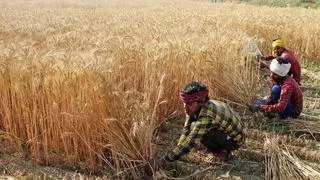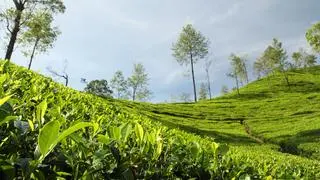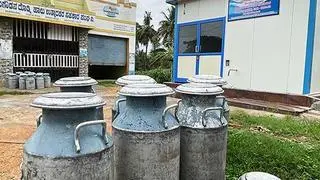A project undertaken by Chennai-based food and agtech start-up WayCool through its model farm Outgrow Agriculture Research Station (OARS) in regenerative farming has shown that cultivation costs can be reduced, while enriching the soil organic carbon value.
“Our findings suggest that when the regenerative farming approach is integrated with the right crop selection, know-how and resources, the improvement in soil organic carbon and reduction in the cost of cultivation is significant,” said Indumathi S, Senior Manager-ES&G, WayCool Foods.
In the case of some crops, the cost of cultivation was 15 per cent lower compared to chemical-reliant conventional farming. The soil organic carbon value at the 2.8 acres OARS model farm at Mudhuganapalli village near Hosur in Tamil Nadu’s Krishnagiri district increased.
Major principle
Indumathi said regenerative agriculture practices could be adapted for all types of crops and varieties. At the model farm, WayCool developed over 120 crop species, ranging from seasonal crops such as vegetables and green leaves to perennial fruit and timber crops. Medicinal plants and herbs were also part of the experimentation given the agro-climatic conditions in the district where the farm is situated.
“Crop diversification is the major principle of regenerative agriculture. As part of crop diversification multi-cropping, trap and border cropping are integrated to reduce pest infestation and to improve soil fertility at OARS,” she said.
Within a year of research at OARS, some of the crops have shown promise such as the Sahoo tomato, whose cultivation cost was 25 per cent less than farming done chemically, while in the case of carrot, the input costs were 15 per cent lower.
“Disco pumpkin and bhendi (okra or lady’s finger) saw a 3 per cent and 16 per cent reduction in the cost of cultivation, respectively, within a year of adopting regenerative agriculture,” the WayCool senior official said.
Annual cropping plan
The adoption of regenerative practices such as natural inputs, mulching, cover cropping and soil treatment resulted in the soil organic carbon value of the farm increasing from 0.56 per cent (in February 2021) to 0.79 per cent (in December 2021), an improvement of 30 per cent.
Indumathi said the regenerative farming team prepared an annual cropping plan based on the farm’s soil (red sandy loam), water type, agro-climatic zone, and major crops cultivated in Krishnagiri district.
“We incorporated regenerative principles of crop diversification, cover cropping, livestock integration and maintaining live roots. Additionally, the soil organic carbon value was studied as a primary indicator of improved soil health due to the farming practice,” she said.
Fundamental practices such as soil testing-based crop nutrition planning (application of natural fertiliser) and regenerative principles improved the flexibility and texture of the soil to grow over 100 species within the 2.8 acres of land. This opens multiple crop production opportunities for the farmer, Indumathi said.
Smart irrigation tech
On what will help farmers take up regenerative farming in a big way, she said the economic benefits of a lower cultivation cost, use of native and hybrid seeds and natural ways of controlling pests and diseases should help.
Smart irrigation technologies and water harvesting can help in the availability of water throughout the year while protecting farmers from the risk of the seasonality of production will be an added incentive.
Regenerative farming reduces the water stress of the crop and it plays a significant role in combating climate change. While the short-term income could be 10-30 per cent higher, in the long-term the benefits could be manifold, including the farm soil and environment, Indumathi said.
On why WayCool chose the project, she said it was to enhance the resilience of the farming community to external vulnerabilities through technology intervention and advisory. Thereby, it would aid small and marginal farmers with sustainable agricultural income.
WayCool took up the project near Hosur as it is a strategic location to farmers and near markets in Tamil Nadu, Karnataka and Andhra Pradesh, besides Bengaluru.
The region leads in growing vegetables with farmers there being “progressive and open-minded” and keen on trying what is best for their farm and revenue. It is also within WayCool’s sourcing operations, she said.








Comments
Comments have to be in English, and in full sentences. They cannot be abusive or personal. Please abide by our community guidelines for posting your comments.
We have migrated to a new commenting platform. If you are already a registered user of TheHindu Businessline and logged in, you may continue to engage with our articles. If you do not have an account please register and login to post comments. Users can access their older comments by logging into their accounts on Vuukle.